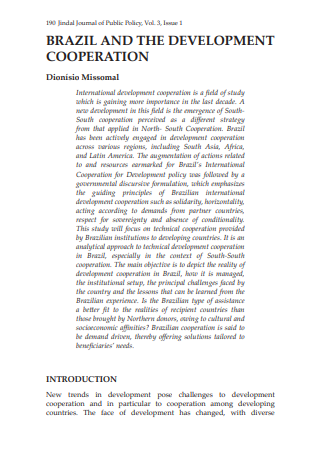Brazil and the Development Cooperation
DOI:
https://doi.org/10.54945/jjpp.v3i1.131Abstract
International development cooperation is a field of study which is gaining more importance in the last decade. A new development in this field is the emergence of SouthSouth cooperation perceived as a different strategy from that applied in North- South Cooperation. Brazil has been actively engaged in development cooperation across various regions, including South Asia, Africa, and Latin America. The augmentation of actions related to and resources earmarked for Brazil’s International Cooperation for Development policy was followed by a governmental discursive formulation, which emphasizes the guiding principles of Brazilian international development cooperation such as solidarity, horizontality, acting according to demands from partner countries, respect for sovereignty and absence of conditionality. This study will focus on technical cooperation provided by Brazilian institutions to developing countries. It is an analytical approach to technical development cooperation in Brazil, especially in the context of South-South cooperation. The main objective is to depict the reality of development cooperation in Brazil, how it is managed, the institutional setup, the principal challenges faced by the country and the lessons that can be learned from the Brazilian experience. Is the Brazilian type of assistance a better fit to the realities of recipient countries than those brought by Northern donors, owing to cultural and socioeconomic affinities? Brazilian cooperation is said to be demand driven, thereby offering solutions tailored to beneficiaries’ needs.







